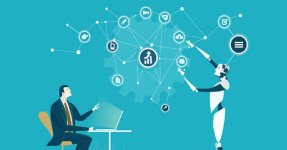Artificial Intelligence (AI) is rapidly transforming many aspects of the workplace, including Human Resources (HR). While AI can significantly enhance HR operations, it is unlikely to completely replace HR professionals. AI excels at automating repetitive and time-consuming tasks such as screening resumes, scheduling interviews, processing payroll, and maintaining employee records. These efficiencies allow HR departments to focus more on strategic planning and employee engagement. AI also enhances decision-making by analyzing vast amounts of data to identify patterns, predict employee turnover, and improve the recruitment process. Tools powered by AI can match candidates to job descriptions more accurately and provide 24/7 assistance through chatbots that answer routine employee queries about benefits, leave policies, or company procedures. Despite these advantages, AI has limitations that prevent it from fully taking over the HR function.
Human Resources is not solely about tasks and data—it is fundamentally about people. Many HR responsibilities require emotional intelligence, empathy, and interpersonal skills that AI cannot replicate. For instance, resolving conflicts between employees, addressing grievances, conducting sensitive conversations, and supporting mental health in the workplace all demand a human touch. HR professionals play a vital role in building workplace culture, fostering trust, and creating an inclusive environment—areas where AI cannot be effective. Moreover, HR often involves complex ethical decision-making that depends on context, values, and human judgment, which AI cannot adequately provide. As a result, while AI will undoubtedly continue to revolutionize how HR functions are performed, it will do so as a supportive tool rather than a replacement for human HR professionals.
In conclusion,AI is a powerful resource that can improve the efficiency and accuracy of many HR tasks. However, the human aspects of HR—such as empathy, ethical judgment, and relationship-building—remain irreplaceable. The future of HR lies in a collaborative approach where AI handles administrative duties and data-driven insights, while human professionals focus on strategy, culture, and employee well-being. This partnership between technology and human expertise will make HR more effective and impactful in the years to come.
Human Resources is not solely about tasks and data—it is fundamentally about people. Many HR responsibilities require emotional intelligence, empathy, and interpersonal skills that AI cannot replicate. For instance, resolving conflicts between employees, addressing grievances, conducting sensitive conversations, and supporting mental health in the workplace all demand a human touch. HR professionals play a vital role in building workplace culture, fostering trust, and creating an inclusive environment—areas where AI cannot be effective. Moreover, HR often involves complex ethical decision-making that depends on context, values, and human judgment, which AI cannot adequately provide. As a result, while AI will undoubtedly continue to revolutionize how HR functions are performed, it will do so as a supportive tool rather than a replacement for human HR professionals.
In conclusion,AI is a powerful resource that can improve the efficiency and accuracy of many HR tasks. However, the human aspects of HR—such as empathy, ethical judgment, and relationship-building—remain irreplaceable. The future of HR lies in a collaborative approach where AI handles administrative duties and data-driven insights, while human professionals focus on strategy, culture, and employee well-being. This partnership between technology and human expertise will make HR more effective and impactful in the years to come.

